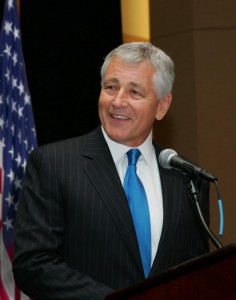 An American analyst says the US seeks to reassure its allies in the Persian Gulf, particularly Saudi Arabia, that it will not change its military commitment in the wake of a recent nuclear deal between Iran and six major world powers,�Press TV�reports.
An American analyst says the US seeks to reassure its allies in the Persian Gulf, particularly Saudi Arabia, that it will not change its military commitment in the wake of a recent nuclear deal between Iran and six major world powers,�Press TV�reports.On Friday, US Secretary of Defense Chuck Hagel conveyed the message that the United States has no plans to scale back its military deployments or arms sales to the Persian Gulf Arab states.
�I will assure our partners that we're not going anywhere," Hagel said before talks with leaders from Bahrain and other regional states.
Bill Jones, with the Executive Intelligence Review, told Press TV on Friday that Pentagon chief�s statements indicated that the US is pursuing two goals in the Middle East.
�One is, of course, to assure our so-called allies including Saudi Arabia who have accepted the fact of the steps forward in US-Iran relations, but they are not terribly happy about it and they are doing other things probably to try to undermine it,� the commentator said.
�So, he wants to send a signal to them to assure them that the United States is not going away and perhaps also to prevent them from taking any unilateral measures that they would take in terms of their build-up or a military action if they felt the United States was on its way out,� Jones added.
He believed that the US also intends to send a message to Iran that although the initial phases of the negotiations are moving forward, they have not reached the point that make Washington feel that �a much smaller force than what is available at this point would be needed.�
On November 24, Iran and the five permanent members of the UN Security Council - Russia, China, France, Britain and the US -- plus Germany clinched an interim deal over the Islamic Republic�s nuclear energy program in the Swiss city of Geneva.
The six-month accord will lay the groundwork for a comprehensive resolution of the West�s decade-old nuclear dispute with Tehran.
However, the US allies in the Middle East, including Israel, Saudi Arabia and other Persian Gulf monarchies, fear the Geneva deal could strengthen Iran�s position as the dominant nation in the region.
�We are not going to change any of our military posture in this area or any part of the world during that six-month period," Hagel said.
"We will keep the same kind of strong assets, the same exercises, the same partnerships, the same focus on our strategic interests that we had before we entered into this six-month period," the Pentagon chief added.
Iran has repeatedly emphasized that its nuclear energy program is only for peaceful purposes and that the country does not need nuclear weapons.
By Press TV
The Iran Project is not responsible for the content of quoted articles.










